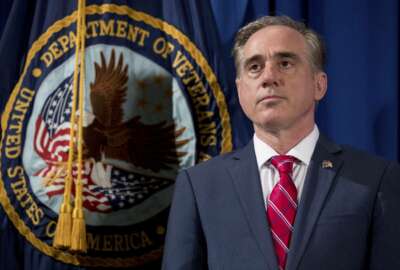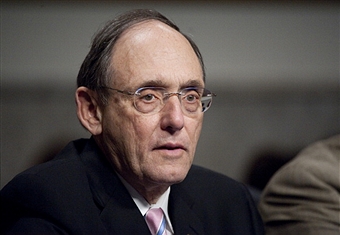
House passes long-awaited VA accountability bill
The House will pass the VA Accountability First and Whistleblower Protection Act, clearing the way for the President to sign the bill later this week. Some...
After years of often heated debate and frustration, the House Tuesday afternoon passed the Veterans Affairs Accountability and Whistleblower Protection Act, the second major piece of legislation in three years that would change accountability procedures at the department.
The bill passed with a 368-55 vote.
Most lawmakers on the House and Senate VA committees and veterans service organizations see the bill’s passage as a win, particularly after a long and contentious battle for new legislation to replace the Veterans Access, Choice and Accountability Act of 2014.
Both chambers have attempted to change the VA Choice Act for years, soon after VA said the legislation wasn’t meeting its needs and the department grew frustrated with three decisions from the Merit Systems Protection Board, which overturned punishments for three senior executives.
Yet this accountability bill moved quickly, in part, because many Democrats say their concerns with this legislation pale in comparison to the issues they saw with past efforts to pass new legislation.
Rep. Tim Walz (D-Minn.), the ranking member of the Veterans Affairs Committee, said he wouldn’t have supported the bill if he thought the legislation stripped away federal employees’ due process rights.
“It is true we need accountability,” Walz told the House Rules Committee during a June 12 hearing on the accountability bill. “That’s not code word for something. That’s not code word to fire everybody. That’s not code word to break a union. It also shouldn’t be code word to pretend everything is fine there and everything is working well.”
VA Secretary David Shulkin thanked Sens. Johnny Isakson (R-Ga.), Jon Tester (D-Mont.) and Marco Rubio (R-Fla.), the bill’s original sponsors, for their work on the legislation. Shulkin said the legislation will help him fulfill one of his biggest priorities for the department.
But federal employee groups have said the bill will do little to tackle accountability problems at VA — challenges that many experts say are entrenched within the department and its culture.
The Senior Executives Association has argued the legislation strikes at the heart of the merit system protections, the provisions that prevent agency officials from making politically influenced hirings and firings.
“SEA is on record supporting stronger accountability initiatives for civil service employees,” SEA President Bill Valdez said in a June 16 letter to the Senate. “We also believe that these accountability measures should be balanced by a new risk/reward framework that incentivizes high performing civil servants and encourages them to excel in the delivery of their vital mission of taking care of our veterans.”
The Federal Managers Association voiced similar concerns.
“We argue the current disciplinary system, as written in statute, is not broken — it simply is not always used as intended,” FMA said in a statement.
The American Federation of Government Employees (AFGE), which represents many VA employees, has also been vocal in its opposition of the bill. AFGE argues the bill is the first step in weakening merit system principles for the entire civil service, not just employees at VA.
“They’re not super happy, but change needed to happen,” Walz said of the federal employee unions’ opposition.
The legislation will:
- Shorten the time employees have to respond to a disciplinary action,
- Shorten the time grievance process to 21 days,
- Expedite the appeals process for rank-and-file employees with the Merit Systems Protection Board,
- Eliminate the MSPB as an avenue for senior executives to appeal disciplinary actions. Instead, SES can appeal directly to the VA secretary and challenge the decision in the courts,
- Codify and strengthen the Office of Accountability and Whistleblower Protection, which President Donald Trump created in a recent executive order, and
- Prohibit bonuses and relocation expenses for employees who have been found guilty of wrongdoing or abuse.
“While the bill changes some of the timelines for filing grievances, it nevertheless respects the grievance procedure in VA employees’ collective bargaining agreements,” Walz said. “That’s called compromise. They should have the right. It’s not an all or nothing. It [took] too dang long before. They should have the right to be able to do that, but there’s no reason it should drag out for years.”
This accountability bill strikes a far better balance than previous legislative attempts, Rep. Mark Takano (R-Calif.) said during the House Rules Committee hearing. He had been a staunch opponent of previous House bills on the topic.
“In passing this legislation I hope we can shift our focus from who is fired from the VA to who is hired at the VA,” Takano said.
The president will almost certainly sign the Accountability and Whistleblower Protection Act; he encouraged the House to pass the bill in a tweet last week.
Senate passed the VA Accountability Act. The House should get this bill to my desk ASAP! We can’t tolerate substandard care for our vets.
— Donald J. Trump (@realDonaldTrump) June 7, 2017
Copyright © 2025 Federal News Network. All rights reserved. This website is not intended for users located within the European Economic Area.
Nicole Ogrysko is a reporter for Federal News Network focusing on the federal workforce and federal pay and benefits.
Follow @nogryskoWFED
Related Stories







